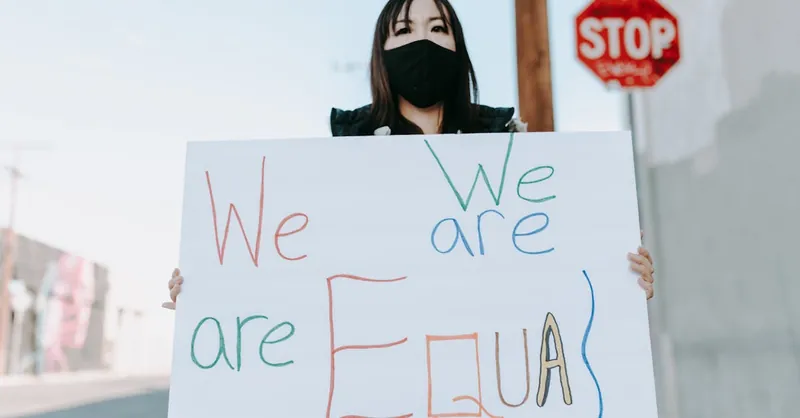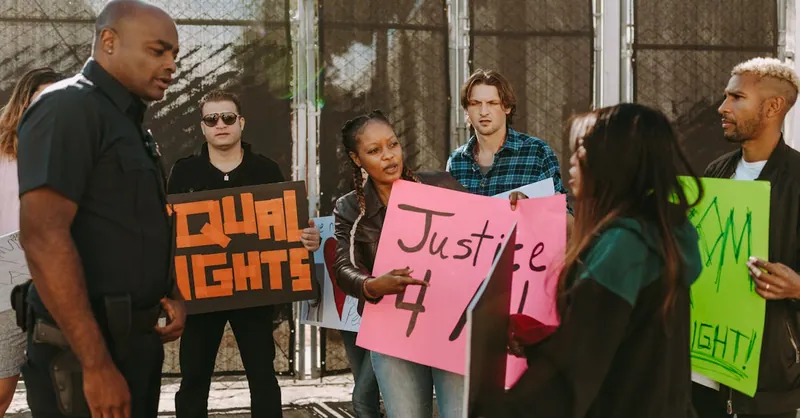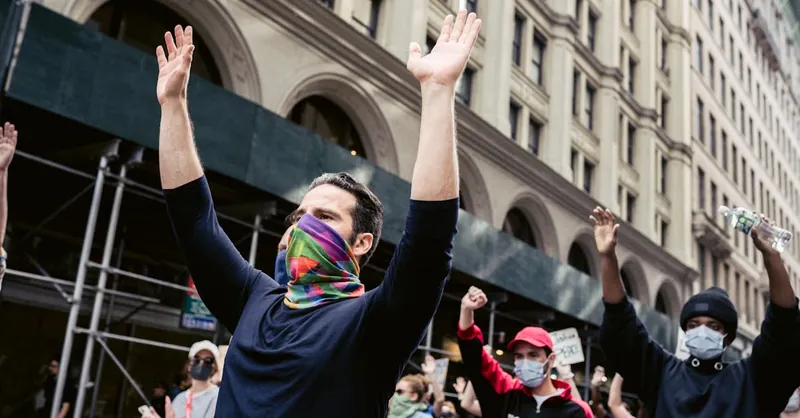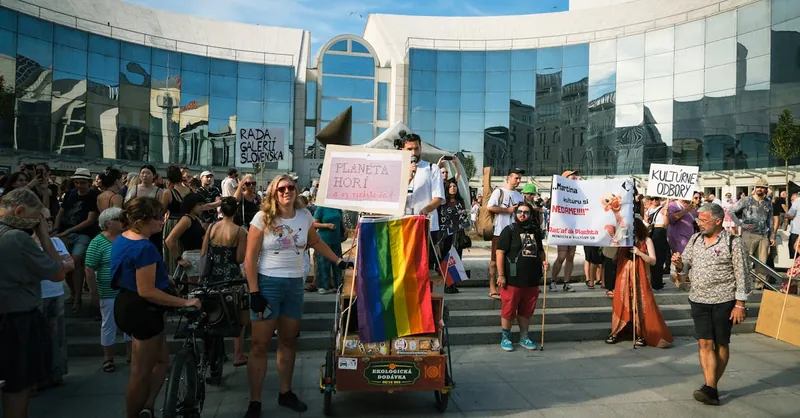Insufferable Karen Moments Exposed: Entitlement & Madness
Category: Social Issues
Unpacking the Madness Behind Insufferable Karen Moments
If you've ever witnessed someone spiraling into an entitlement-fueled spectacle in public, chances are you’ve encountered an 'insufferable Karen moment.' Our readers are socially conscious individuals frustrated by disruptive behaviors that fuel injustice and unfairness. You’ve landed on this blog because you want more than viral clips of temper tantrums—you want a deeper understanding of the cultural roots and social implications behind such scenes. Maybe you’re a community advocate, a cultural commentator, or someone who frequently encounters entitlement-driven conflicts and wants to decode what’s truly going on. This post cuts through the noise and viral memes to critically evaluate what makes these moments a broader social concern. We’ll cover the psychology behind entitlement, historical context, real-life case studies, and the impact on social justice efforts. Unlike typical sensationalized accounts, this article provides a reasoned, nuanced critique that respects your awareness and desire for meaningful content. Ready to explore the madness, understand its origins, and learn how to handle or counteract such behavior? Dive in to uncover insights that help make sense of these increasingly common but troubling social phenomena.
- Unpacking the Madness Behind Insufferable Karen Moments
- Defining the ‘Karen’ Phenomenon: Origins and Evolution of the Term
- Common Traits of Insufferable Karen Moments: Entitlement and Disrespect
- Psychology Behind Karen Behavior: Narcissism, Privilege, and Social Conditioning
- Real-World Examples: Viral Insufferable Karen Moments That Sparked Outrage
- Impact on Communities: How Karen Moments Perpetuate Systemic Injustice
- Social Media Amplification: Role of Viral Videos in Shaping Perceptions
- Legal and Ethical Boundaries: When Karen Behavior Crosses the Line
- Navigating Encounters: Strategies to Defuse or Confront Entitled Behavior
- Cultural Reflection: What Karen Moments Reveal About Societal Inequities
- Moving Beyond Mockery: Constructive Responses for Social Change
Defining the ‘Karen’ Phenomenon: Origins and Evolution of the Term
The term ‘Karen’ has rapidly transformed from a simple given name to a cultural shorthand symbolizing a specific type of entitlement-driven behavior predominantly displayed by middle-aged white women. Originating in early 2010s internet culture, the label first emerged in memes and social media as a way to highlight instances of privilege, disruptive demands, and unwarranted complaints, often involving calls for managerial intervention over trivial matters. Over time, what started as internet satire evolved into a widely recognized social critique targeting patterns of unchecked entitlement, racial insensitivity, and abuse of social power.
Understanding the evolution of the ‘Karen’ label requires tracing several important factors:
1. Meme Culture and Viral Videos – Social media platforms like Twitter, TikTok, and YouTube amplified stories and videos showcasing individuals demanding special treatment or weaponizing their perceived authority.
2. Sociopolitical Context – The term gained heightened relevance amid broader conversations about systemic racism, inequality, and social justice, where ‘Karen moments’ often intersect with racial profiling and microaggressions.
3. Intersection with Identity and Demographics – While rooted in portrayals of white women, the term has sparked debates about gender, race, and class stereotypes, making its use both powerful and controversial.
By unpacking the origins and social dynamics behind the term ‘Karen,’ we move beyond simple name-calling to confront how these behaviors perpetuate injustice and unfairness in everyday interactions. This critical perspective helps uncover why ‘Karen moments’ are not just isolated incidents but symptoms of larger societal inequities that demand attention and accountability.

Image courtesy of RDNE Stock project
Common Traits of Insufferable Karen Moments: Entitlement and Disrespect
At the core of most insufferable Karen moments lie two interconnected traits: entitlement and disrespect. These behaviors not only disrupt peaceful social interactions but also reinforce systemic inequalities and social discord. Understanding these common traits is essential to grasp why such moments resonate so strongly and why they continue to incite frustration across communities.
Entitlement: The Root of the Problem
Entitlement in a Karen moment typically manifests as an unwavering belief in special treatment, regardless of others’ rights or circumstances. This often expresses itself through demands for immediate service, privileges denied to others, or an insistence on bending rules to fit one’s own preferences. Key characteristics include:
1. Unrealistic expectations of authority and influence, such as demanding to speak with managers or higher-ups to escalate insignificant issues.
2. Assuming priority over others, often based on perceived social status, race, or gender, without regard for fairness or context.
3. Ignoring social boundaries and communal norms, which allows entitlement to spill into aggressive or invasive behavior.
Disrespect: Undermining Social Respect and Equality
Entitlement is often paired with a blatant disregard for others’ dignity and experiences. Disrespect in Karen moments manifests through:
- Interruptions and dismissive language, frequently interrupting or talking over service workers, bystanders, or marginalized individuals.
- Rude or condescending tone and gestures designed to intimidate or belittle others in public spaces.
- Lack of empathy toward those affected by structural inequalities, such as frontline workers or community members from diverse backgrounds.
Together, these traits create a toxic environment that undermines efforts toward equity and respect in public life. Karen moments, therefore, are not just about individual rudeness—they expose deeper fractures in societal attitudes toward privilege, power dynamics, and social justice. Recognizing these patterns helps advocates and observers better confront and address these behaviors before they escalate into broader social harm.

Image courtesy of Yan Krukau
Psychology Behind Karen Behavior: Narcissism, Privilege, and Social Conditioning
To truly understand the persistence and intensity of insufferable Karen moments, it's crucial to explore the psychological underpinnings that drive this behavior. At the crossroads of narcissism, privilege, and social conditioning, Karen behaviors reveal more than surface-level entitlement—they reflect deep-seated patterns reinforced by individual psychology and societal systems.
Narcissism and the Need for Control
One core psychological factor fueling Karen antics is narcissistic personality traits. While not every person labeled a 'Karen' has a clinical diagnosis, many display tendencies such as:
1. Exaggerated sense of self-importance, believing their needs and opinions inherently outweigh others’.
2. Lack of empathy, which diminishes their ability to recognize or care about the impact of their actions on others.
3. A compulsive desire for control and admiration, often expressed through demanding interactions and confrontational behavior.
These narcissistic tendencies manifest publicly as the relentless demand to “speak to the manager,” asserting dominance in social situations to reaffirm a fragile self-image built on superiority and entitlement.
Privilege as an Invisible Shield
Underlying insufferable Karen moments is often an unquestioned sense of privilege tied to race, gender, socioeconomic status, or a combination thereof. This privilege acts as an invisible shield that:
- Reinforces entitlement, creating a belief that rules or social norms either don't apply or can be bent for their convenience.
- Erodes accountability, since societal systems frequently protect privileged individuals from consequences for disruptive or harmful behavior.
- Perpetuates systemic inequities, as these behaviors disproportionately disadvantage marginalized groups who lack similar access to power or recourse.
Understanding privilege is essential to decoding why some individuals feel emboldened to behave with impunity in public and social settings, often at the expense of others’ dignity and rights.
Social Conditioning and Learned Behavior
Finally, social conditioning shapes and normalizes Karen behavior across generations and communities. Influences include:
- Family and cultural messages emphasizing entitlement or superiority based on identity markers like race or class.
- Media portrayals that both reflect and reinforce expectations of dominance, especially for certain demographic groups.
- Lack of exposure to diverse perspectives, leading to ingrained biases and misunderstandings about fairness and respect.
This social conditioning creates a feedback loop where entitled behavior is learned, reinforced, and rarely challenged effectively, allowing Karen moments to become recurring societal patterns rather than isolated incidents.
By connecting the dots between narcissism, privilege, and social conditioning, we gain a richer, more nuanced understanding of the Karen phenomenon—one that exposes how individual psychology and broader societal structures converge to produce these troubling displays of entitlement and disrespect. This insight is key for advocates and community members seeking to dismantle the underlying causes rather than merely reacting to the symptoms.

Image courtesy of Mikhail Nilov
Real-World Examples: Viral Insufferable Karen Moments That Sparked Outrage
Across social media platforms and news outlets, viral Karen moments have become emblematic of entitlement and disregard that fuel public outrage and social unrest. These incidents often involve high-profile confrontations where individuals publicly wield their perceived authority or privilege to disrupt service, escalate minor disputes, or enforce exclusionary behavior. Examining these real-world cases not only illustrates the patterns discussed earlier but also highlights the broader societal impact of such conduct.
Notorious Incidents that Captured National Attention
-
The Central Park Birdwatching Incident (2020)
Perhaps one of the most widely publicized Karen moments occurred when a white woman called police on a Black birdwatcher in Central Park, falsely accusing him of threatening her. This case sparked national conversations on racial profiling, abuse of emergency services, and weaponization of white privilege. The ensuing backlash underscored how entitlement can intersect dangerously with systemic racism, amplifying injustice. -
Retail Manager Demands During the Pandemic
Numerous videos surfaced of customers aggressively confronting retail workers over mask mandates or store policies. These scenarios vividly demonstrate how entitlement can escalate to hostility against frontline workers, who are often underpaid and vulnerable, worsening social inequities during a global health crisis. The viral nature of these encounters has prompted calls for enhanced worker protections and reinforced awareness of customer accountability. -
The “Stay in Your Lane” Pool Incident
Another example involves a white woman enforcing arbitrary racial boundaries at a neighborhood pool, telling Black residents to leave or adhere to rules selectively enforced. This incident illustrates the exclusionary behavior and microaggressions that Karen moments propagate, which sustain segregationist attitudes and undermine community cohesion.
Patterns and Social Consequences Revealed by Viral Clips
These cases reveal several alarming patterns in insufferable Karen moments:
- Public use of authority to silence or intimidate marginalized groups.
- Weaponization of social and institutional privileges to avoid repercussions.
- Amplification of racial and class divides through performative outrage.
Such viral incidents contribute to a climate of mistrust and frustration, especially among communities disproportionately targeted by these behaviors. The outrage that these videos spark is a reflection of deeper societal calls for accountability, justice, and systemic reform. Understanding and exposing these viral Karen moments equips advocates, bystanders, and policymakers with concrete examples to challenge entitlement-driven injustice and promote a more equitable public sphere.

Image courtesy of RDNE Stock project
Impact on Communities: How Karen Moments Perpetuate Systemic Injustice
Insufferable Karen moments do far more harm than momentary public disturbances; they actively perpetuate systemic injustice by reinforcing patterns of exclusion, inequality, and social fragmentation in communities. When entitlement-driven behaviors manifest publicly—such as weaponizing privilege to silence marginalized voices or bypass rules arbitrarily—they deepen long-standing disparities rooted in race, class, and power dynamics. These moments create hostile environments that undermine social cohesion and erode trust between community members.
Reinforcement of Structural Inequities
Karen behaviors often operate as microcosms of larger systemic problems by:
1. Normalizing racial profiling and discrimination, as seen when privileged individuals exploit societal biases to accuse or exclude others unjustly.
2. Amplifying economic disparities, where demands for special treatment disregard the dignity and rights of lower-wage workers disproportionately from marginalized backgrounds.
3. Delegitimizing communal authority and mutual respect, by insisting on unilateral control over shared spaces and resources without accountability.
Such actions perpetuate cycles of oppression by making marginalized groups bear the brunt of entitlement and unchecked privilege. The ripple effects extend beyond isolated interactions to influencing policies, community relations, and social justice movements.
Erosion of Community Trust and Inclusion
Moreover, Karen moments corrode the fabric of inclusive communities by fostering fear, resentment, and division. This erosion manifests in:
- Heightened tensions and conflicts between residents and within public spaces, making environments less safe and welcoming for everyone.
- Discouraging civic engagement and solidarity, since those targeted by entitlement-driven aggression may withdraw from participating fully in communal life.
- Impeding progress toward equity, as social justice efforts face backlash or derailment caused by high-profile incidents of entitlement that spotlight persistent inequalities.
Addressing the impact of Karen moments is essential for building more just, respectful, and resilient communities. Recognizing how these behaviors sustain systemic injustice empowers advocates and policymakers to develop targeted strategies that challenge entitlement culture, promote accountability, and foster genuine social inclusion.

Image courtesy of Life Matters
Social Media Amplification: Role of Viral Videos in Shaping Perceptions
The rise of social media platforms has played a pivotal role in magnifying insufferable Karen moments, transforming isolated incidents into viral phenomena that shape public perception and discourse. Platforms such as TikTok, Twitter, Instagram, and YouTube act as amplifiers for entitlement-driven behaviors, rapidly spreading videos and stories that expose these disruptive encounters to global audiences. This amplification significantly impacts how society understands and reacts to Karen behavior, often with complex implications for social justice and accountability.
How Viral Videos Influence Public Awareness and Dialogue
-
Rapid Dissemination and Widespread Reach
Viral Karen videos circulate quickly across digital networks, reaching millions within hours. This rapid spread raises awareness about patterns of entitlement and privilege that might otherwise remain unseen or unchallenged by mainstream media. Highlighting real-time examples sharpens public understanding of how these behaviors perpetuate injustice in everyday settings. -
Framing and Narrative Control
While viral content brings visibility, the way videos are framed and captioned can shape narratives—sometimes simplifying complex social dynamics into caricatures or memes. This can reinforce stereotypes or provoke outrage without fostering nuanced conversations about root causes like systemic inequality and privilege. -
Social Accountability and Public Shaming
Viral exposure often leads to public backlash, holding individuals accountable by subjecting them to widespread criticism and sometimes real-world consequences. This mechanism empowers victims and advocates by spotlighting abuses of power but can also fuel sensationalism or online harassment that detracts from constructive dialogue. -
Mobilizing Social Justice Movements
Shared viral content has proven instrumental in mobilizing activism, as footage of Karen moments intersecting with racial profiling, discrimination, or worker mistreatment galvanizes collective calls for reform. Social media thus serves as a tool for community organizing, education, and solidarity-building against entitlement-fueled injustice.
SEO Keywords to Emphasize
- Viral Karen videos
- Social media amplification
- Entitlement behavior exposure
- Karen moments public outrage
- Digital activism against privilege
- Online accountability for entitlement
- Viral social justice content
By critically examining the role of viral videos in popularizing Karen moments, we uncover how social media shapes both awareness and misunderstandings of entitlement culture. This awareness is key to harnessing digital platforms effectively—to not only expose insufferable behavior but also to promote informed conversations and systemic change.

Image courtesy of Suki Lee
Legal and Ethical Boundaries: When Karen Behavior Crosses the Line
While many insufferable Karen moments are frustrating displays of entitlement and disrespect, some escalate into legal and ethical violations that demand serious attention. Understanding where Karen behavior crosses the line highlights the importance of accountability and safeguards against abuse of power in public and private spaces. This section explores how entitlement-driven actions can become unlawful or unethical, and what frameworks exist to confront such conduct.
Legal Transgressions Commonly Linked to Karen Behavior
Entitlement fueled by privilege sometimes manifests in ways that violate laws or regulations, notably including:
1. Harassment and Threatening Behavior – Repeated aggressive demands, verbal abuse, or intimidation tactics aimed at workers or marginalized individuals may constitute harassment under civil or criminal statutes. These acts can trigger legal repercussions when reported.
2. Filing False Reports or Misusing Emergency Services – Several high-profile Karen incidents involved false police reports based on discriminatory assumptions. Such misuse can lead to criminal charges like filing a false report and exacerbate systemic inequalities within law enforcement.
3. Discrimination and Exclusion – Enforcing arbitrary rules or selectively applying policies to exclude or harass others may violate anti-discrimination laws, especially in public accommodations or housing contexts. These actions undermine civil rights protections and invite legal challenges.
4. Property Damage or Trespassing – Insisting on rule-bending or retaliation against service workers can escalate to damage of property or trespassing claims, further complicating the legal consequences of entitlement-driven confrontations.
Ethical Implications and Community Responsibility
Beyond legal concerns, Karen behavior raises significant ethical questions about respect, fairness, and social responsibility. Key ethical breaches include:
- Abuse of Social Power and Privilege – Using identity or status to coerce or intimidate others violates principles of equity and justice foundational to ethical social interaction.
- Undermining Public Trust – When entitlement behaviors erode communal norms and breed conflict, they diminish the mutual respect necessary for cohesive, inclusive communities.
- Ignoring the Harm Caused to Vulnerable Populations – Ethical conduct demands empathy and accountability, both of which are often absent when Karen behaviors marginalize frontline workers, racial minorities, or economically disadvantaged groups.
Holding Karens Accountable: Legal Remedies and Social Solutions
Addressing Karen moments that cross legal or ethical boundaries requires a multidimensional approach:
- Legal Enforcement and Reporting Mechanisms – Encouraging victims and bystanders to document and report harassment, discrimination, or false reporting helps activate institutional responses and deterrents.
- Organizational Policies and Training – Businesses and public institutions can implement clear codes of conduct and staff training to identify and manage entitlement-driven misconduct effectively.
- Community Education and Awareness – Promoting understanding of privilege, legal rights, and ethical behavior empowers communities to resist and challenge Karen behaviors before they escalate.
- Restorative Justice Practices – When possible, facilitating dialogue and accountability through restorative frameworks can repair harm and transform entitlement culture.
By defining the legal and ethical boundaries of Karen behavior, this discussion underscores the necessity of proactive measures to prevent entitlement from devolving into abuse or discrimination. Effective intervention protects vulnerable individuals, upholds justice, and fosters respectful social environments critical for equity and inclusion.

Image courtesy of Yan Krukau
Navigating Encounters: Strategies to Defuse or Confront Entitled Behavior
Dealing with insufferable Karen moments in real life can be challenging, especially when entitlement and disruptive behavior threaten to escalate conflict or perpetuate injustice. Whether you’re a bystander, frontline worker, or community advocate, having effective strategies to defuse or confront entitled behavior is crucial to maintaining dignity, promoting accountability, and protecting social fairness. Approaching these encounters with a balance of calmness, clarity, and assertiveness can mitigate harm and redirect situations toward constructive resolution.
Practical Approaches to Deescalation
When faced with an entitled individual exhibiting Karen-like behavior, consider these deescalation techniques:
1. Stay calm and composed – Emotional regulation is key; responding with anger or frustration often fuels escalation rather than resolution.
2. Use active listening – Acknowledge their concerns without validating unreasonable demands, which can sometimes defuse the urge to escalate.
3. Set clear boundaries – Politely but firmly communicate what behavior is unacceptable, emphasizing respect and community rules.
4. Avoid power struggles – Redirect focus away from confrontation, offering solutions when possible without engaging in circular arguments.
5. Seek support when needed – If the situation becomes unsafe or unmanageable, involve supervisors, security, or authorities trained to handle disputes.
When and How to Confront Entitlement Assertively
In some cases, it may be necessary to confront Karen behavior directly to uphold justice and social equity. Effective confrontation requires strategic communication:
- Call out privileged behavior respectfully yet unequivocally, highlighting how entitlement impacts others and violates community standards.
- Use “I” statements to express how their actions affect you or others, reducing defensiveness while emphasizing accountability. For example, “I feel disrespected when rules are ignored because it affects everyone’s safety.”
- Provide factual information about policies, legal rights, or social norms to counter misinformation or baseless demands without engaging personal attacks.
- Encourage reflection and empathy, inviting the individual to consider perspectives beyond their own entitlement mindset.
- Document the interaction when appropriate, especially in professional or public environments, to ensure evidence exists for any necessary follow-up.
Promoting Long-Term Cultural Change
Beyond individual encounters, dismantling entitlement culture requires collective effort and proactive education. Advocates and community leaders can:
- Develop awareness campaigns that spotlight the social harm caused by Karen moments and promote empathy and respect.
- Implement training programs on diversity, inclusion, and privilege for workplaces, schools, and public institutions to reduce ignorance-driven entitlement.
- Foster community dialogues that encourage shared understanding and collaborative norms against abusive behavior.
- Support policies that empower vulnerable groups and hold entitled individuals accountable through institutional mechanisms.
Mastering these strategies to navigate and confront entitlement equips individuals and communities to transform disruptive Karen moments from sources of division into opportunities for social growth and justice reinforcement. This approach not only minimizes immediate harm but also builds resilience against future episodes of entitlement-driven injustice.

Image courtesy of cottonbro studio
Cultural Reflection: What Karen Moments Reveal About Societal Inequities
Insufferable Karen moments serve as more than just instances of personal entitlement; they act as windows into deep-rooted societal inequities embedded within culture and institutions. These public displays of privilege and disrespect expose how historical power imbalances continue to shape everyday interactions and reinforce systemic barriers. By analyzing Karen behavior through a cultural lens, we gain critical insight into the persistent inequalities related to race, class, and gender that fuel these moments—and why they provoke such widespread frustration and calls for justice.
Unmasking Entitlement as a Symptom of Social Hierarchies
At their core, Karen moments reflect a belief system nurtured by unequal social hierarchies where certain identities—often white, middle-class women—expect preferential treatment and deference. This entitlement is not simply individual arrogance but an extension of long-standing cultural norms that assign unearned power and privilege based on race, socioeconomic status, and gender. These moments reveal:
- The lingering impact of racial privilege, where assumptions of innocence and authority disproportionately favor white individuals, often at the expense of people of color.
- Class-based entitlement that minimizes the labor and dignity of service workers, many of whom occupy marginalized economic positions.
- Gendered dynamics that complicate how power is expressed and perceived, with some Karens leveraging societal expectations of femininity for social control.
Reinforcing and Challenging Systemic Inequality through Behavior
Karen moments highlight how cultural conditioning sustains structural injustices: they often enact or reinforce exclusion, discrimination, and social boundaries in daily life. Yet, these incidents also spark critical awareness and resistance by illuminating privilege in action. Recognizing the cultural significance allows advocates and bystanders to:
- Connect individual entitlement to broader patterns of systemic oppression, rather than viewing these moments as isolated rudeness.
- Critically examine social norms and institutional policies that enable or excuse privilege-driven behavior.
- Leverage cultural reflection to promote empathy, equity, and inclusion, moving beyond indignation to meaningful change.
In essence, Karen moments are not random spectacles but cultural reflections of injustice, mirroring and magnifying inequalities that permeate society. Understanding this broader context is vital for dismantling entitlement culture and advancing true social equity through informed awareness and collective action.

Image courtesy of William Gevorg Urban
Moving Beyond Mockery: Constructive Responses for Social Change
While viral clips of insufferable Karen moments often elicit laughter or outrage, moving beyond mockery is essential to address the underlying entitlement and systemic injustices these moments reveal. Constructive responses focus on transforming public awareness into proactive social change, promoting accountability, equity, and empathy rather than mere spectacle. This shift from ridicule to reform is crucial for dismantling the cultural and structural factors that enable entitlement-driven behavior to persist.
Empowering Communities Through Education and Dialogue
One of the most effective ways to combat Karen behavior is through education that highlights the social roots of entitlement and privilege. Raising awareness about how these behaviors perpetuate structural inequality encourages individuals to:
- Recognize entitlement patterns within themselves and others, fostering self-reflection instead of defensiveness.
- Engage in open, honest conversations about race, class, and power dynamics that underlie many Karen moments.
- Promote empathy and respect for marginalized groups disproportionately affected by such conduct.
Community forums, workshops, and social media campaigns that focus on inclusive dialogue and critical consciousness help shift the narrative from simple shaming to collective responsibility and growth.
Advocacy and Policy Reforms Targeting Entitlement Culture
Beyond personal change, addressing Karen moments requires institutional and policy-driven solutions that hold entitled behavior accountable and protect vulnerable populations. Key approaches include:
- Implementing clear anti-harassment and anti-discrimination policies in workplaces, retail environments, and public spaces to deter entitlement-fueled misconduct.
- Training for employees, managers, and law enforcement on recognizing and appropriately responding to behaviors rooted in privilege and entitlement.
- Supporting systemic reforms that reduce power imbalances, such as equitable customer service protocols and community oversight mechanisms.
These structural measures ensure that entitlement is not merely challenged on an individual level but systematically dismantled wherever it fosters injustice and social harm.
Leveraging Digital Activism for Sustained Impact
Social media, while amplifying Karen moments, can also be a powerful tool for mobilizing digital activism that promotes social justice and accountability. Supporters can:
- Share educational content and nuanced analyses that contextualize incidents, moving beyond viral outrage to informed engagement.
- Organize online campaigns that call for policy changes and support affected communities, amplifying marginalized voices.
- Hold privileged individuals accountable by encouraging restorative conversations and public commitments to change rather than only punitive shaming.
Harnessing the reach of digital platforms thoughtfully helps transform viral Karen moments from divisive spectacles into catalysts for ongoing awareness and reform.
By embracing these constructive responses, activists, educators, and everyday citizens can counteract entitlement-driven injustice and foster a culture grounded in equity, dignity, and mutual respect. This proactive stance is vital to converting the frustration inspired by Karen moments into meaningful social progress.

Image courtesy of Polina Tankilevitch
